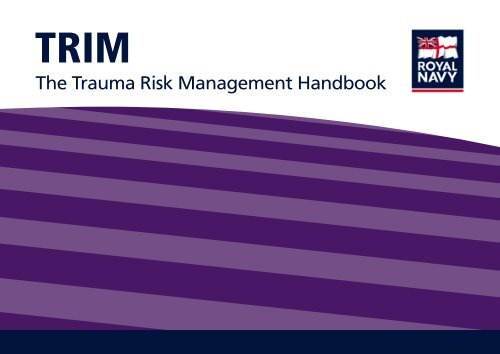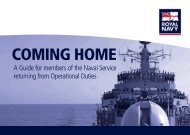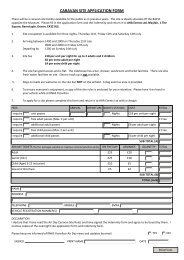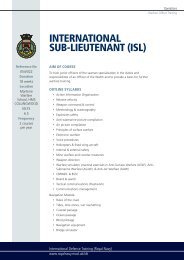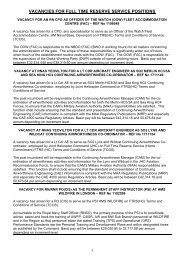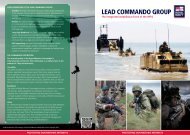The Trauma Risk Management Handbook
The Trauma Risk Management Handbook
The Trauma Risk Management Handbook
Create successful ePaper yourself
Turn your PDF publications into a flip-book with our unique Google optimized e-Paper software.
TRIM<br />
<strong>The</strong> <strong>Trauma</strong> <strong>Risk</strong> <strong>Management</strong> <strong>Handbook</strong>
FOREWORD<br />
In the aftermath of a traumatic event, you could be faced with a number of differing reactions. It may be<br />
that the incident has had no marked effect on you, or conversely, you may be profoundly affected and facing<br />
a number of strange and new emotions. <strong>The</strong> goal of this booklet is to outline the coping strategies and<br />
assistance that is available to individuals serving within the Naval Service.<br />
In addition to self-help strategies, the booklet will give details of the CINC Fleet <strong>Trauma</strong> <strong>Risk</strong> <strong>Management</strong><br />
(TRIM) Programme. TRIM has evolved out of the Royal Marines Stress <strong>Trauma</strong> Project and has been functional<br />
for six years. It is based on the principles of education, risk assessment and mentoring. <strong>The</strong> programme is<br />
peer group delivered i.e. the Stress Practitioners you may come into contact with are non-medical uniformed<br />
members of the Fleet. <strong>The</strong>y are drawn from all branches and ranks of the Naval Service and have undertaken<br />
specific trauma training. However, it should be noted that they are not counsellors or therapists, but<br />
individuals who are able to listen to your story and offer practical advice and assistance.<br />
As you read this booklet you will see that the recurring theme is that "YOU ARE NOT ALONE". Assistance<br />
is readily available and can be used and accessed without critique or stigma. Remember that the feelings<br />
that you may be experiencing are perfectly normal, it is the nature of the stressful incident that is abnormal.<br />
If you are reading this booklet in the aftermath of a traumatic event and been offered the help of a Stress<br />
Practitioner, his or her contact details are included on the final page of this booklet. Also included is a list of<br />
more general telephone numbers that you or your family and friends may find useful.<br />
Page 1 Page 1
THE TRIM STRESS HANDBOOK<br />
What are traumatic incidents<br />
A traumatic incident is any event that can be considered to be outside of an individual's usual experience and<br />
causes physical, emotional or psychological harm.<br />
We all respond in different ways to any event, but this handout highlights the usual responses of individuals<br />
and may offer some help in relieving the anxiety such incidents cause, assist in the healing process and give<br />
some assistance in identifying further sources of help.<br />
<strong>The</strong> determining factor around the emotional responses for anyone involved in, or responding to, an incident<br />
can centre on challenges to core beliefs about ourselves or how we see the world. For instance, we may<br />
acknowledge that we could die within the next 24 hours (be run over by a bus, involved in a crash or an<br />
explosion) but if we really believed that our life might not last beyond tomorrow, we might well be revising<br />
what we intended doing - rather than me writing, or you reading this!<br />
It is important to remember that other factors in your life may contribute to your vulnerability to any incident,<br />
and its impact upon you.<br />
Reactions to a critical incident are likely to be worse if ...<br />
<strong>The</strong>re has been a death.<br />
<strong>The</strong>re is a feeling of wanting to have done more.<br />
<strong>The</strong>re is little or no perceived support from colleagues, family or friends.<br />
<strong>The</strong> incident follows closely on top of stress creating events in your life.<br />
Page 2
Reactions may include:<br />
Sadness<br />
Guilt<br />
Anger<br />
Shame<br />
Fear<br />
Memories<br />
Disappointment<br />
for deaths, injuries or losses of every kind;<br />
for not having done more; for having survived;<br />
at what has happened, at whoever caused it;<br />
or let it happen;<br />
at the injustice of it all;<br />
at the lack of understanding of others;<br />
at the inefficiencies in the "system";<br />
Why me<br />
for not having reacted as one would have wished;<br />
for having been seen as helpless, "emotional" or needing others;<br />
of "breaking down" or "losing control";<br />
of a similar event happening again;<br />
of feelings of loss or of concern for other people in your life;<br />
of past, similar events;<br />
which can alternate with Hope.<br />
Physical and mental reactions<br />
You may have some physical reactions, with or without the feelings described above. Sometimes they may<br />
develop long after the event.<br />
Physical reactions include tiredness, sleeplessness, palpitations, nausea, headaches, neck and back aches,<br />
muscular tension, tightness in the chest and throat, changes in eating habits and sexual interest.<br />
Page 3 Page 3
Mental reactions may be loss of concentration and/or motivation, poor memory, nightmares, flashbacks<br />
(feeling that it is happening all over again), hypervigilance (always on your guard), or being easily startled.<br />
Irritability, loss of sense of humour and impatience with self and others are extremely common, and can<br />
put relationships with family and friends under strain. Try to remember that they too may be suffering<br />
additional stress, may feel left out, or do not understand how best to support you.<br />
You may find yourself withdrawing from those closest to you, unable to express your feelings, rejecting what<br />
is offered.<br />
Stop - and try to ask for what you want.<br />
Remember this<br />
Our bodies and minds will look after themselves - reactions are a natural process.<br />
Nature will heal if you allow feelings to come out into the open.<br />
Concealing feelings can prolong the recovery period.<br />
Sometimes there is a sense that too little or the wrong things are being offered, or that you cannot live up to<br />
others' expectations of you. Alcohol and drug intake may increase.<br />
Page 4<br />
What's this got to do with me<br />
More than you think, or may want to admit to, even to yourself.<br />
Let's put it into a personal context ...<br />
... how many times have you responded to an incident Do you get a hollow feeling in your stomach in<br />
those few seconds before arrival at the scene of an incident, engaged in combat or after the alarm bells have<br />
sounded. Accept it or not, most emergency workers do.
When it's all over, think hard for a moment about how you feel.<br />
<strong>The</strong> nature of our work can bring us into direct contact with some traumatic situations. We have the<br />
advantage of training, skills and techniques that can minimise the danger to ourselves and others, but it is a<br />
fact that traumatic incidents do happen. <strong>The</strong>se incidents can happen with very little warning. Colleagues can<br />
be hurt, some badly.<br />
Perhaps you know someone who has been exposed to one of these traumatic incidents, perhaps you have<br />
been affected yourself. How do you feel about that When you respond to the incident, you have no idea<br />
what you are running into. Fortunately most incidents are dealt with quickly and without traumatic effects<br />
but there is always the risk of finding colleagues and shipmates that have been very badly injured or killed.<br />
An incident may not involve physical injury to self or colleagues. <strong>The</strong> sudden death of an individual<br />
(particularly when it is a friend or a child) can have a great impact on those who find and try to revive the<br />
person.<br />
Usually the incident is discussed over a coffee or a drink. That's fine, it's one way of easing the stress, but<br />
how many of us are totally honest with ourselves, let alone our colleagues about how we really felt at the<br />
time. If you were terrified, would you admit it <strong>The</strong> truth is that the risk of injury to ourselves and others is<br />
always present. Stressful, isn't it<br />
After the incident<br />
<strong>The</strong>re are some strategies you can use to make things easier to bear post incident. Your mind's defence<br />
mechanism may not let you feel the full impact of an incident straight away, often you are in shock. Your<br />
feelings will slowly unfold as the days go by.<br />
Page 5 Page 5
You may feel numb if your feelings are blocked and the event may seem unreal, almost dream like,<br />
and you may even wonder if it ever happened at all.<br />
Keeping yourself occupied with other things may help, your hobby, PT, additional work, etc.<br />
However, when combined with the numbing effect, this can be over used and delay your recovery.<br />
Talking to friends or colleagues, who were also involved, about the incident and how you feel.<br />
Returning to the scene of the event is one way of confronting the reality of it all.<br />
Dreaming about the event possibly repeatedly, is not uncommon. This is nature's way of helping you<br />
to collate and absorb the information.<br />
Having the support of others can be invaluable. Don't say "no", if it is offered. It may come from<br />
others who have had a similar experience. It is important not to isolate yourself. If you are feeling<br />
this way, then it is safe to assume that others have done so too under similar circumstances.<br />
<strong>The</strong>re are times when you may need to be alone with your thoughts and feelings. Again, this is<br />
natural. Equally, you may need the company of your shipmates, family and friends.<br />
Pain, unfortunately may be part of the healing process.<br />
Stress <strong>Risk</strong> Assessment<br />
If the incident involves death or serious injury you should access a CINC <strong>Trauma</strong> <strong>Risk</strong> <strong>Management</strong> (TRIM)<br />
Practitioner. <strong>The</strong>y will assist you and possibly carry out a stress risk assessment. <strong>The</strong> aim of the risk assessment<br />
is to ascertain how much stress an individual has assimilated as a result of an incident.<br />
Page 6
1. Focus of the <strong>Risk</strong> Assessment Meeting<br />
It is an opportunity to allow us to see how you are coping with the event in order that we can help you get<br />
any assistance you might need or feel you need. We also hope that you will gain reassurance about natural<br />
reactions to traumatic situations and have an opportunity to discuss coping strategies. Finally, the meeting<br />
will assist in pooling your experiences and resources.<br />
2. Confidentiality<br />
Everything that is said within this meeting is completely confidential. That said, if we become concerned<br />
about issues that affect your personal safety, or the safety of your colleagues, we reserve the right to inform<br />
your line manager. However, in this event, we give you an assurance that we will always discuss the issue<br />
with you first.<br />
Some DOs and DON'Ts of dealing with your feelings<br />
Don't bottle up your feelings.<br />
Don't avoid talking about what happened.<br />
Don't expect the memories to go away immediately, they may be with you for quite some time.<br />
Don't be too hard on yourself, give yourself a bit of ‘slack’ whilst you adjust to what has happened.<br />
Do express your emotions - to someone.<br />
Do accept opportunities to share your experience with others - they may have something to offer.<br />
Page 7 Page 7
Do make time to review the experience within yourself, but try to avoid isolating yourself.<br />
Do take the time to be with your family and friends.<br />
Do try and tell your family, close friends, shipmates, colleagues and managers how you feel.<br />
Do try to keep to your routines as much as possible.<br />
Do drive with greater care, your concentration may be impaired.<br />
Do be more careful - accidents are more likely to happen at this time.<br />
When to look for additional help ...<br />
If you feel you are not able to handle intense feelings, or physical reactions continue.<br />
If you feel numb and your feelings are detached.<br />
If you have to keep highly active in order to cope.<br />
If you continue to have nightmares, or are sleeping badly.<br />
If you have no one, or a group with whom to share your feelings, and you feel the need to do so.<br />
If your relationships seem to be suffering badly, or sexual problems develop.<br />
If you are having accidents, or your work performance is suffering.<br />
If you are smoking or drinking to excess since the event.<br />
Page 8
If you are suffering from depression or exhaustion.<br />
If you cannot control your memories of the event and they are affecting your sense of personal well<br />
being.<br />
Remember you are basically the same person that you were before the event and that talking about the<br />
event and your feelings can help.<br />
Remember help is available.<br />
Page 9 Page 9
POST INCIDENT<br />
In the aftermath of an incident or your tour of duty, you should try to re-establish your normal social and<br />
work routines as quickly as possible. In the majority of cases individuals will leave (with good reason) the<br />
operation or incident taking with them a very positive view of their role on the operation. However, in certain<br />
cases people may find that in the weeks and months that follow, they may encounter intrusive thoughts that<br />
are both detrimental and unproductive.<br />
Detailed below are a number of common strategies that an individual may encounter when dealing with<br />
heightened stress levels:<br />
Page 10<br />
Negative Coping Actions<br />
<strong>The</strong>se will increase the chance that you will experience problems. <strong>The</strong>y may appear to reduce distress<br />
immediately, but short-circuit more permanent beneficial change. Actions that may immediately seem<br />
effective that cause later problems can be addictive, like smoking or alcohol abuse. <strong>The</strong>se habits can become<br />
difficult to change. Negative coping methods can include isolation, use of alcohol, "workaholism", violent<br />
behaviour, angry intimidation of others, eating disorders and different types of self-destructive behaviour.<br />
Before learning more effective and healthy coping some people with symptoms try to cope with their distress<br />
and other reactions in ways that will lead to more problems. Consider the following types of negative coping<br />
action.<br />
Use of Alcohol or Drugs<br />
This may help wash away memories, increase social confidence or induce sleep. But it will cause<br />
more problems than it cures, by creating a dependence on alcohol, harming judgement and mental<br />
ability, causing problems in relationships with family and friends, and sometimes, placing a person<br />
at risk of suicide or accidents. In your own experience of life, think how many people that you know<br />
who use alcohol to deal with life stresses are really content <strong>The</strong> answer will be a round figure, zero.
Social Isolation<br />
By reducing contact with the outside world you may avoid many situations that cause you to feel<br />
afraid, irritable or angry. However, isolation will also cause major problems. It will result in loss of<br />
social support, friendship and intimacy. It may breed further depression and fear. Less participation in<br />
positive activities leads to less opportunity for positive emotions and achievements.<br />
Anger<br />
Like isolation, anger gets rid of many upsetting situations by keeping people away. But it also keeps<br />
away positive connections and help and gradually drives away the important people in a person's<br />
life. It may also lead to job problems, marital or relationship problems and a loss of friendships.<br />
Continuous Avoidance<br />
Avoidance of thinking about the unpleasant event or about the fact that you may need some<br />
additional help keeps away distress, but prevents progress in coping with trauma and its<br />
consequences. Avoidance can prevent people from seeking help with their problems.<br />
Positive Coping Actions<br />
Individuals who will have experienced unpleasant events need to take active steps to deal with their<br />
problems. Often these steps involve making a series of thoughtful changes in lifestyle to reduce symptoms<br />
and improve the quality of life. Common lifestyle changes you may wish to consider include:<br />
Page 11 Page 11
Increasing Contact<br />
<strong>The</strong> best way of dealing with this is to seek understanding and camaraderie and support of other<br />
people who have been employed on operations or involved in the incident. By making contact with<br />
others who have been through similar things, it is often possible to reverse the process of more<br />
isolation and distress in others. This in turn will slow down the worsening cycle of symptoms and<br />
soften the impact on the individual.<br />
Re-investing in Personal Relationships with Family and Friends<br />
Take action to have more contact with family and friends and working at improving those<br />
relationships, reconnect to others and get more good things happening in your lives again. You may<br />
feel that you are unable to recount your stressful experiences for fear that the listener is unable to<br />
cope. Remember that people generally have more strength and fortitude than we give them credit<br />
for. <strong>The</strong> majority of friends and families would rather be included than excluded from your pain.<br />
Stop Drinking Excessive Amounts of Alcohol<br />
Many people have experienced unpleasant events and use alcohol or even drugs to help cope with<br />
their symptoms. However, alcohol and other drugs are possibly having some seemingly positive<br />
effects in the short-term, but always make things worse in the medium or long-term. <strong>The</strong>refore, it<br />
is important for you to stop using alcohol to excess. <strong>The</strong>se lifestyle changes are required if you are to<br />
benefit from treatment and stay on the path to recovery.<br />
Start an Exercise Programme<br />
Exercise, even in moderation has a number of possible benefits for those suffering from trauma<br />
symptoms; walking, jogging, swimming, weight lifting and other forms of exercise reduce physical<br />
Page 12
tension. It also helps distract the individual from painful memories or worries and thus give them a<br />
break from difficult emotions. Perhaps most importantly, they can improve self-esteem and create<br />
feelings of personal control.<br />
Volunteer to assist in the Community<br />
On your return to re-establish yourself, it is important that you feel like you have something to offer<br />
others and that you perceive yourself as making a positive contribution. When you are not feeling<br />
100% it can be hard to generate these positive feelings. To regain your feeling of contribution,<br />
consider volunteering and helping with activities within the Naval or local community. This in turn<br />
will enhance your own feelings of self-esteem.<br />
Lifestyle Balance<br />
Besides being more aware of coping strategies, there are many complimentary ways to restore lifestyle<br />
balance. <strong>The</strong>se will assist you in keeping track and allow you to make progress. By adopting the lifestyle<br />
changes you will discover a path to regain your balance in the aftermath of being exposed to or witnessing<br />
traumatic experiences.<br />
Physical Self Care<br />
Eat regularly eg, breakfast, lunch, dinner<br />
Eat healthily<br />
Exercise<br />
Get enough sleep<br />
Take leave<br />
Page 13 Page 13
Page 14<br />
If possible, try to make time to be away from telephones<br />
Seek help if feeling unwell<br />
Psychological Self Care<br />
Make time for self reflection<br />
Read literature that is unrelated to work<br />
Do something at which you are not an expert or in charge<br />
Attempt to decrease stress in your life<br />
Notice your inner experiences<br />
Listen to your thoughts, judgements, beliefs, attitudes and feelings<br />
Practice receiving help from others (help, advice, friendship)<br />
Emotional Self Care<br />
Spend time with others whose company you enjoy<br />
Stay in contact with important people in your life<br />
Find a way to increase your sense of self esteem<br />
Re-read favourite books<br />
Identify comforting activities, objects, people, relationships, places and seek them out<br />
Find things to make you laugh<br />
Relax
Spiritual Self Care<br />
Make time for reflection<br />
Be open to inspiration<br />
Cherish optimism and hope<br />
For Family Members, Friends and Colleagues<br />
In the aftermath of an incident or upon returning from stressful tour of duty, you may become aware that<br />
the character or personality of a person close to you has changed. This is likely to be a temporary change<br />
and, with your help and support they will quickly resume their normal persona. To assist a person who has<br />
been exposed to traumatic events it may be useful to employ the following steps:<br />
Listen carefully<br />
Spend time with a traumatised person<br />
Offer your assistance and a listening ear even if they have not asked for help, reassure them<br />
Help them with everyday routine tasks<br />
Allow them some private time<br />
Do not take their anger or other feelings personally<br />
Do not tell them that they are lucky it was not worse or you will get over it or to pull<br />
yourself together; these statements do not console traumatised people. Instead tell them that you<br />
recognise such an event has occurred and that you want to understand and assist them.<br />
Page 15 Page 15
Journal Your Thoughts<br />
It may be useful to write down or jot down your thoughts regarding the traumatic event. <strong>The</strong> next two pages<br />
have been included to allow you to journal your reactions and emotions, and in time, read and reflect on<br />
your feelings following the traumatic incident.<br />
Page 16
Page 17 Page 17
Finally<br />
You should not give yourself a hard a time over events that have already happened. Instead, try to reorientate<br />
yourself and think about the event in a positive way. Review the whole event in its real place<br />
within your life (like a small pebble on a big beach). When recounting or mulling over stressful incidents,<br />
it is unhelpful to review or self critique your actions in a negative light. Instead, think about the event in<br />
a beneficial way and concentrate on the positive aspects of the incident. To do this effectively takes some<br />
effort (you may not be used to doing this, but like physical exercise it gets easier with practise). Remember,<br />
fortitude brings its own very positive rewards.<br />
Page 18
Your TRIM Stress Practitioner is.................................................................................................<br />
Telephone Number...................................................................................................................<br />
E-mail Address..........................................................................................................................<br />
Dates of future meetings..........................................................................................................<br />
Page 19 Page 19
Page 20<br />
NOTES
fleetgraphicscentre 10/228


